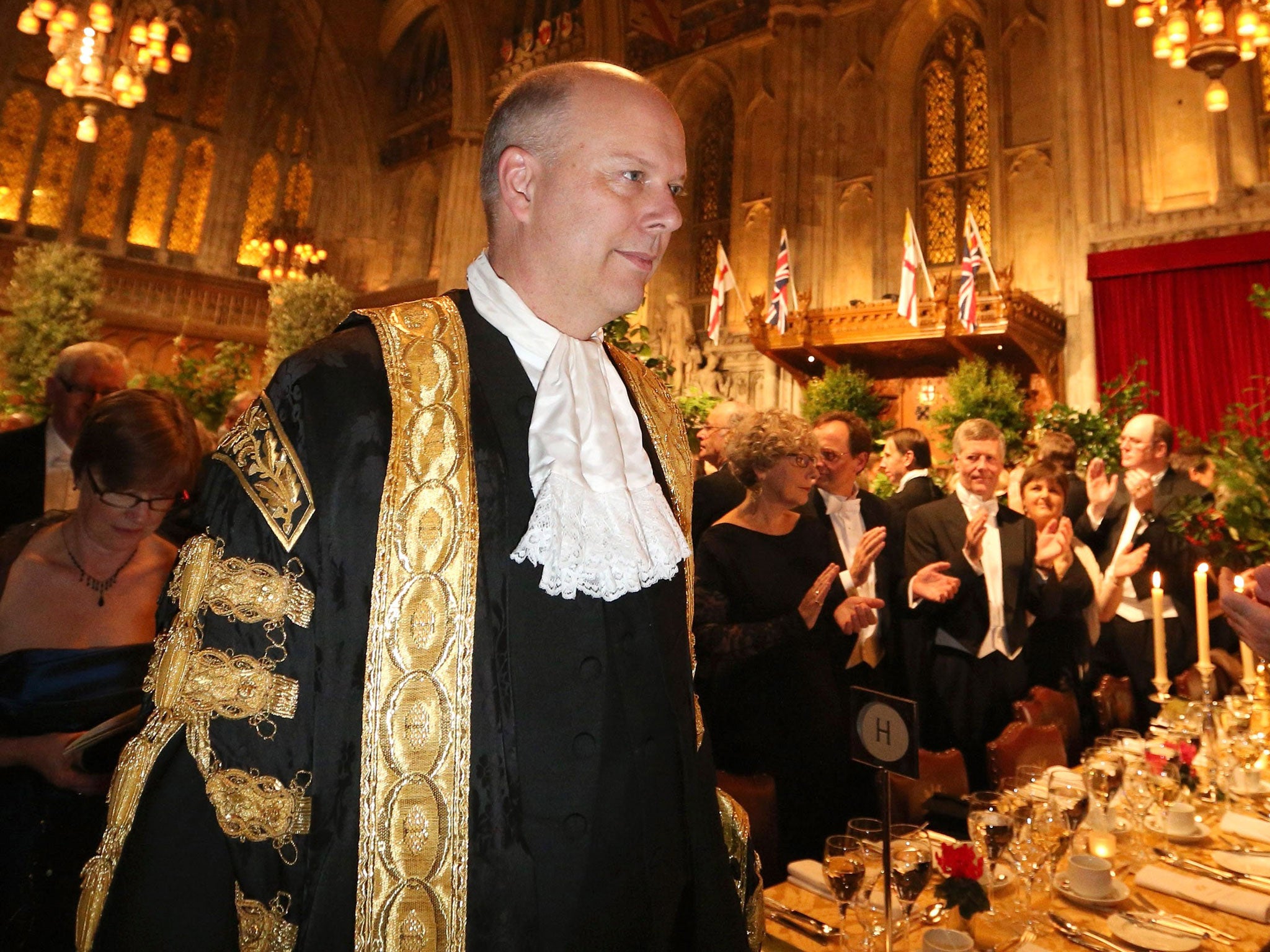Justice minister, Chris Grayling, accused of legal interference
Chris Grayling's department signed a prisoner anonymity order – then he overturned it

Your support helps us to tell the story
From reproductive rights to climate change to Big Tech, The Independent is on the ground when the story is developing. Whether it's investigating the financials of Elon Musk's pro-Trump PAC or producing our latest documentary, 'The A Word', which shines a light on the American women fighting for reproductive rights, we know how important it is to parse out the facts from the messaging.
At such a critical moment in US history, we need reporters on the ground. Your donation allows us to keep sending journalists to speak to both sides of the story.
The Independent is trusted by Americans across the entire political spectrum. And unlike many other quality news outlets, we choose not to lock Americans out of our reporting and analysis with paywalls. We believe quality journalism should be available to everyone, paid for by those who can afford it.
Your support makes all the difference.Chris Grayling, the Justice Secretary and Lord Chancellor, was at the centre of a major legal row last night amid accusations that he politically interfered with a judicial decision taken by his own department.
Senior officials acting on behalf of Mr Grayling, in his official capacity as Secretary of State, signed a "consent order" granting anonymity to a prisoner who is applying to be moved to an open jail after serving decades of a life sentence for murder.
A High Court hearing last month heard how the anonymity order was approved by the Secretary of State and the Parole Board after the man's lawyers argued he could be attacked, or even killed, in the new prison if his identity was revealed, as the nature of his crime was so horrendous. The order prevented reporting of the man's identity and his victims.
Yet when the court hearing was reported by the Daily Mail, which voiced outrage that the prisoner's rights were being put before the feelings of his victims' families, a spokesman for Mr Grayling claimed he had never approved the order.
As Labour last night called for an inquiry into the affair, the Ministry of Justice stated that the order had been signed on behalf of Mr Grayling because of a "misunderstanding" by officials, and that the minister had no personal knowledge of the decision. The minister has ruled that the order must be overturned.
Yet sources close to the case question how the Lord Chancellor, who is the first non-lawyer to hold this post, could later overturn a legally binding decision signed off by the Treasury solicitor – one of the most senior legal officials in government – on the minister's own behalf.
A House of Lords ruling in 1994 made clear that when a Secretary of State is a party to litigation and is represented by the Treasury solicitor, undertakings on his behalf in his official capacity are binding, regardless of whether the minister knew about the case personally. This means, legal sources say, that Mr Grayling could be acting in breach of his powers in trying to overturn his own department's decision.
The leading QC Geoffrey Robertson, whose chambers are representing the prisoner, said in a letter to government officials, seen by this newspaper: "It is in consequence a simple fact that the Secretary of State was a consenting party to the Anonymity Order and it was wrong for his department to deny this fact." In a separate letter to Mr Grayling, Mr Robertson said it was a "blatant and readily demonstrable lie" that the minister did not support the ruling, since his own officials were present at the court hearing on 23 January.
Legal sources also question how a "misunderstanding" could have happened when the case involving the prisoner, known only as "M", is a well-known and sensitive one inside the Ministry of Justice.
The shadow Justice Secretary, Sadiq Khan, who is to table questions in Parliament calling for an inquiry into the affair, said last night: "Playing politics with a very sensitive and important legal issue, and allegations that false information was fed to the [press] which may have smeared the reputation of the barrister involved, is not the behaviour the public expect of the Lord Chancellor.
"If the facts of the case show that the offender's anonymity was approved on behalf of the Secretary of State, then he must immediately retract his statement that attacked the decision, and issue a swift apology to those whose reputations are being damaged. We need... an inquiry into how this happened, and questions I am asking about... whether [the Secretary of State] authorised his spokesperson or special adviser to issue a statement need answering immediately.
"To be in a situation where the Lord Chancellor is attacking a court's decision, yet that very decision was approved on his behalf, calls into... doubt Mr Grayling's appropriateness to be in charge of our legal system."
The Constitutional Reform Act 2005 removed the judicial functions of the Lord Chancellor, which are now taken by the Lord Chief Justice. In 2011, Lord Phillips of Worth Matravers, a former Lord Chief Justice, said he was "very committed to the independence of the judiciary from the executive".
A Ministry of Justice spokesman said: "A consent order was signed by the Treasury solicitor in the case of R(M) v Parole Board. This was as a result of a misunderstanding between government officials. The Secretary of State did not give his approval for the anonymity order. We have applied to have the order set aside."
Join our commenting forum
Join thought-provoking conversations, follow other Independent readers and see their replies
Comments